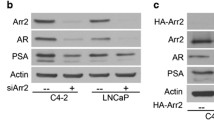Abstract
The study aims to investigate the changes and regulation of androgen receptor and insulin-like growth factor-1 in the PC3 prostate cells treated with 5α-dihydrotestosterone, estrone, and flutamide. The PC3 cells were cultured and treated with 5α-dihydrotestosterone, estrone, and flutamide. Immunocytochemistry and Western blot were used to detect the expression of androgen receptor and insulin-like growth factor-1. The androgen receptor expression was analyzed by Western blot and optic density scan in the presence or absence of various kinase inhibitors. The statistical calculations were performed with the statistics-analyzing software package SPSS 13.0. A P <0.05 was considered statistically significant. The concentrations of 5α-dihydrotestosterone and flutamide could almost not change the expression of androgen receptor and insulin-like growth factor-1 in PC3. But, the concentrations of estrone could increase the expression of androgen receptor and insulin-like growth factor-1 when PC3 cells are exposed to the studied concentration at various times. The expression of androgen receptor was regulated by the inhibitor of signal pathways of PI3, MEK1/2, and JUK. The expressions of androgen receptor and insulin-like growth factor-1 were influenced by estrone and were not influenced by 5α-dihydrotestosterone and flutamide in PC3 cells. And, the expression of androgen receptor was regulated by multiple signal pathways.





Similar content being viewed by others
References
Naiki T, Okamura T, Kawai N, Sakagami H, Yamada Y, Fujita K, et al. Advantages of second line estramustine for overall survival of hormone-refractory prostate cancer (HRPC) patients. Asian Pac J Cancer Prev. 2009;10:71–4.
Cai C, Balk SP. Intratumoral androgen biosynthesis in prostate cancer pathogenesis and response to therapy. Endocr Relat Cancer. 2011;18:R175–82.
Shiota M, Yokomizo A, Fujimoto N, Naito S. Androgen receptor cofactors in prostate cancer: potential therapeutic targets of castration-resistant prostate cancer. Curr Cancer Drug Targets. 2011;11:870–81.
Otsuka T, Iguchi K, Fukami K, Ishii K, Usui S, Sugimura Y, et al. Androgen receptor W741C and T877A mutations in AIDL cells, an androgen-independent subline of prostate cancer LNCaP cells. Tumor Biol. 2011;32:1097–102.
Tong DY, Wen XQ, Jin Y, Liu ZW, Sun HY, Zhou FJ, et al. Changes of androgen receptor and insulin-like growth factor-1 in LNCaP prostate cancer cells treated with sex hormones and flutamide. Asian Pac J Cancer Prev. 2010;11:1805–9.
So A, Gleave M, Hurtado-Col A, Nelson C. Mechanisms of the development of androgen independence in prostate cancer. World J Urol. 2005;23:1–9.
Gill JK, Wilkens LR, Pollak MN, Stanczyk FZ, Kolonel LN. Androgens, growth factors, and risk of prostate cancer: the multiethnic cohort. Prostate. 2010;70:906–15.
Mikami K, Ozasa K, Nakao M, Miki T, Hayashi K, Watanabe Y, et al. Prostate cancer risk in relation to insulin-like growth factor (IGF)-I and IGF-binding protein-3: a nested case–control study in large scale cohort study in Japan. Asian Pac J Cancer Prev. 2009;10:57–61.
Wang Y, Shao C, Shi CH, Zhang L, Yue HH, Wang PF, et al. Change of the cell cycle after flutamide treatment in prostate cancer cells and its molecular mechanism. Asian J Androl. 2005;7:375–80.
Lv T, Tian B, Zhang X. Changes of androgen receptor expression in hormonal dependent prostatic cancer and independent prostatic cancer. Medical Journal of Wuhan University. 2007;28:181–4.
Fuse H, Korenaga S, Sakari M, Hiyama T, Ito T, Kimura K, et al. Non-steroidal antiandrogens act as AF-1 agonists under conditions of high androgen-receptor expression. Prostate. 2007;67:630–7.
Narimoto K, Mizokami A, Izumi K, Mihara S, Sawada K, Sugata T, et al. Adrenal androgen levels as predictors of outcome in castration-resistant prostate cancer patients treated with combined androgen blockade using flutamide as a second-line anti-androgen. Int J Urol. 2010;17:337–45.
Yuan X, Balk SP. Mechanisms mediating androgen receptor reactivation after castration. Urol Oncol. 2009;27:36–41.
Yanase T, Fan W. Modification of androgen receptor function by IGF-1 signaling implications in the mechanism of refractory prostate carcinoma. Vitam Horm. 2009;80:649–66.
Nickerson T, Chang F, Lorimer D, Smeekens SP, Sawyers CL, Pollak M. In vivo progression of LAPC-9 and LNCaP prostate cancer models to androgen independence is associated with increased expression of insulin-like growth factor I (IGF-I) and IGF-I receptor (IGF-IR). Cancer Res. 2001;61:6276–80.
Takahara K, Azuma H, Sakamoto T, Kiyama S, Inamoto T, Ibuki N, et al. Conversion of prostate cancer from hormone independency to dependency due to AMACR inhibition: involvement of increased AR expression and decreased IGF1 expression. Anticancer Res. 2009;29:2497–505.
Acknowledgments
We wish to thank Prof. Guo quan Gao in the Department of Biochemistry and Molecular Biology, Zhong shan School of Medicine, Sun Yat-Sen University, for technical direction. This study was supported by the Special Fund for Basic Research from the Ministry of Education, P.R. China (project no. 505015).
Conflicts of interest
None
Author information
Authors and Affiliations
Corresponding author
Rights and permissions
About this article
Cite this article
Tong, D.y., Wu, X.y., Sun, H.y. et al. Expression changes and regulation of AR and IGF-1 in PC3 prostate cancer cells treated with sexual hormones and flutamide. Tumor Biol. 33, 2151–2158 (2012). https://doi.org/10.1007/s13277-012-0475-3
Received:
Accepted:
Published:
Issue Date:
DOI: https://doi.org/10.1007/s13277-012-0475-3




